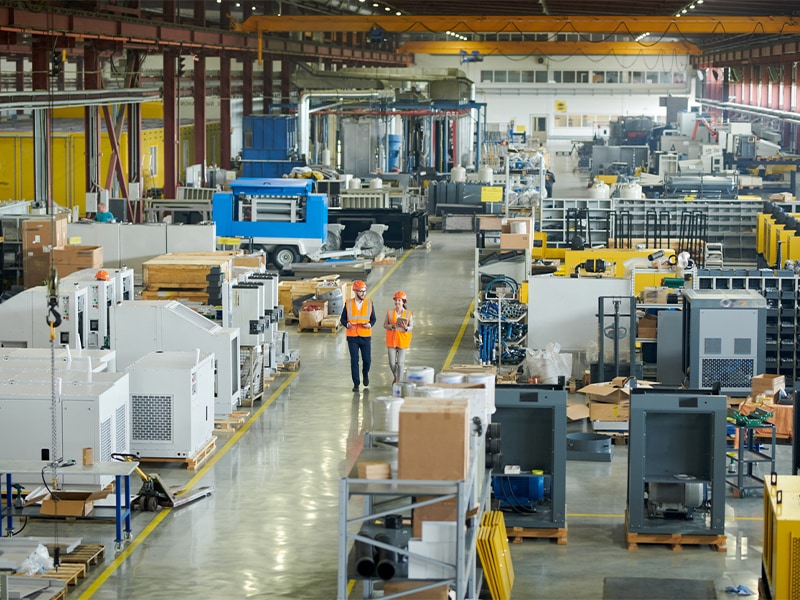RPA (Robotic Process Automation)
Manufacturing Industry Automation with RPA

In the manufacturing industry, operational efficiency and cost reduction are critical to maintaining competitiveness. With constant pressure to streamline processes, reduce downtime, and enhance throughput, manufacturers need a solution that can handle repetitive, time-consuming tasks without compromising accuracy. Robotic Process Automation (RPA) provides a way to optimize operations across various manufacturing functions—from inventory management and order fulfillment to supply chain coordination.
RPA can automate tasks that are essential to maintaining the smooth running of manufacturing operations. By integrating RPA with existing systems, manufacturers can reduce human error, improve data accuracy, and accelerate critical processes, leading to improved efficiency, reduced costs, and enhanced decision-making capabilities.
Discover more about this product.
Click here to book your demo.

Common Challenges in Manufacturing & How RPA Helps Overcome Them
Manual Inventory Management
Inventory management is a fundamental part of manufacturing operations. However, manual inventory tracking can be prone to errors, leading to overstocking or stockouts. RPA can automate inventory management by automatically updating stock levels, generating purchase orders when necessary, and sending alerts when stock reaches a predefined threshold.
Supply Chain Coordination
Coordinating supply chain activities, such as procurement, logistics, and transportation, involves managing multiple processes and stakeholders. RPA can help streamline this by automating order processing, tracking shipments, and updating delivery schedules. This results in fewer delays and better coordination across the entire supply chain.
Order Fulfillment and Processing Delays
Manufacturers often face delays in fulfilling orders due to manual processing of customer orders, invoicing, and shipping. RPA can automate the entire order fulfillment process—from receiving orders to generating invoices and dispatching goods. This reduces delays and ensures that orders are processed in real time.
Benefits of RPA for the Manufacturing Industry
- Improved Efficiency: RPA speeds up processes by automating tasks such as data entry, order processing, and inventory tracking, allowing manufacturing teams to focus on more complex activities.
- Cost Reduction: Automation of repetitive tasks reduces the need for manual labor and minimizes the risk of human error, lowering operational costs.
- Faster Order Fulfillment: RPA automates the order-to-cash cycle, accelerating order processing, invoicing, and shipping, leading to quicker turnaround times and improved customer satisfaction.
- Better Decision-Making: RPA generates accurate, real-time data, providing insights into key metrics such as inventory levels, order status, and production schedules, enabling better-informed decision-making.
- Enhanced Supply Chain Visibility: RPA enables continuous monitoring of supply chain activities, improving visibility and enabling manufacturers to respond more quickly to disruptions or changes.
Integrating RPA with Manufacturing Systems
RPA integrates seamlessly with a wide range of manufacturing systems, including:
- Enterprise Resource Planning (ERP) Systems
- Customer Relationship Management (CRM) Systems
- Manufacturing Execution Systems (MES)
- Inventory Management Systems (IMS)
- Supply Chain Management (SCM) Systems
These integrations ensure that RPA can work with your existing technology infrastructure, improving data flow across various systems and minimizing the need for manual intervention.
Designed for Business Users
Unlike traditional automation tools that require scripting or IT involvement, our platform is no-code and intuitive. Users can build and manage their own automations using drag-and-drop logic and built-in recording features. Whether you’re automating simple tasks or complex workflows, you can do it without advanced technical training.
Who Benefits the Most?
- Production Teams: Automate production scheduling, machine monitoring, and order tracking to reduce manual oversight and improve throughput.
- Supply Chain Managers: Streamline procurement, logistics, and shipment tracking to ensure timely delivery and reduce delays.
- Inventory Management Teams: Automate inventory updates, stock alerts, and order generation for more accurate inventory control.
- Sales and Customer Service Teams: Speed up order processing, invoicing, and shipping to enhance customer satisfaction.
By implementing RPA, manufacturers can improve operational efficiency, reduce downtime, and enhance the accuracy of their processes. RPA helps drive digital transformation, allowing manufacturers to stay competitive in a fast-paced market.
FAQs
How Does RPA Help With Manufacturing Operations?
RPA automates repetitive tasks like order processing, inventory tracking, and production scheduling. It improves efficiency, reduces manual errors, and accelerates key processes such as supply chain coordination and order fulfillment.
What Are the Benefits of RPA in Manufacturing?
The key benefits include improved efficiency, cost reduction, faster order fulfillment, better decision-making, and enhanced supply chain visibility. RPA helps manufacturers streamline processes, reduce errors, and boost overall productivity.
Can RPA Integrate With Existing Manufacturing Systems?
Yes, RPA integrates with a wide range of manufacturing systems, including ERP, CRM, MES, IMS, and SCM tools. This ensures that RPA can work seamlessly with your existing infrastructure to improve data flow and reduce manual intervention.
We’re here to provide you with more details.
Reach out today!





